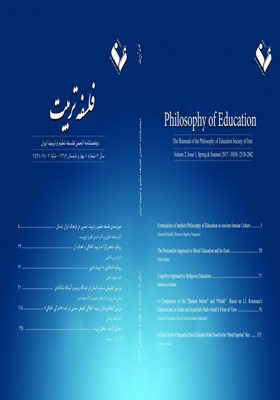صورت بندی فلسفه تعلیم و تربیت ضمنی در فرهنگ ایران باستان
محورهای موضوعی : تاریخ و ماهیت رشته فلسفهٔ تعلیموتربیت، مکاتب و رویکردهای فلسفهٔ تعلیموتربیت قدیم و جدید ،تاریخ اندیشه و عمل تربیتی (سیاستها، برنامهها، اقدامات و...) مفاهیم، گزارهها و نظریههای تربیتی آراء مربیان و فیلسوفان تربیتی روششناسی پژوهشهای تربیتی انواع تربیت مسائل تعلیموتربیت ایران و جهان برنامه درسی و آموزش در رشتههای گوناگوندکتر سمانه خلیلی 1 * , خسرو باقری 2
1 -
2 - دانشگاه تهران
کلید واژه:
چکیده مقاله :
هدف این مقاله استخراج فلسفه تعلیم و تربیت ایران بر مبنای ویژگیهای فرهنگی ایران باستان است. به این منظور، با در نظر داشتن تعریف تیلور از فرهنگ و تأکید بر چهار عنصر اثرساز شامل حکومت، شرایط اجتماعی، دین و آموزش و پرورش و با استفاده از روشهای تحقیق تاریخی، تحلیل استعلایی و استنتاج به تحلیل و صورتبندی فلسفه تعلیم و تربیت ضمنی ایران باستان پرداخته شده است. یافتههای پژوهش شامل هدف غایی تربیت، مفهوم اساسی تربیت، مبانی فلسفی (انسانشناسی، معرفتشناسی و ارزششناسی) و اصول حاصل از آن میباشند. بررسییافتههای پژوهش نشان میدهد که هدف غایی تعلیم و تربیت«دستیابی به خیر» است و در این راستا به ابعاد مختلف وجود انسان توجه میشود و این نکته، بهویژه در وجه فردی، از نقاط مثبت فلسفه ضمنی تربیت ایران باستان است. در بخش مربوط به انسانشناسی، نگاه جبری به انسان و تواناییهایش، همچنین عدم تحرک اجتماعی و تعلق به طبقه اجتماعی خاص، قابل انتقاد است. در حیطه معرفتشناسی، وابستگی معرفت به طبقات اجتماعی، عدم توجه به ارزش فینفسه دانش و تسلط رویکردهای تقلیدی در برابر تعقلی از نقاط ضعف این فلسفه تربیتی است. در حیطه ارزششناسی نیز نقاط قوت و ضعفی وجود دارند. در بعد اجتماعی پایبندی به ارزشهای طبقاتی و عدم قدرت انتخاب در آنها نقطه منفی بهحساب میآید. اما در حیطه فردی و ارزشهای فردی، پایبندی افراد و نقش خانواده در انتقال ارزشها از نقاط مثبت بهشمار میرود.
The purpose of this article is to extract the Iranian philosophy of education based on the cultural characteristics of the ancient Iran. To obtain this aim, we will consider Taylor’s definition of culture and his emphasis on four main elements including state, social conditions, religion and education. In terms of research methods, we will employ historical method, transcendental analysis, and practical deduction. The findings of this research are organized in terms of the final goal of education, the fundamental concept of education, the philosophical foundations (anthropology, epistemology, and axiology) and the principles derived from them. Accordingly, in the ancient Iran, the final goal of education was “attaining goodness” and in this regard, different dimensions of human existence were considered. This point, especially in the individual aspect is one of the strengths of implicit philosophy of ancient Iranian education. Concerning anthropology, there was a deterministic look to human and his abilities, as well as social immobility and belonging to a particular social class, characteristics that can be criticized. In epistemology, the dependence of knowledge on the social classes, the lack of attention to the value of knowledge itself and the domination of imitative approaches over rationalization are among the weaknesses of this educational philosophy. There are also strengths and weaknesses in its axiology. In the social dimension, the stability of class values and the lack of power of choice are negative points. On the other hand, in terms of individual values, the commitment of individuals and the role of the family in transferring values are considered to be positive points.

